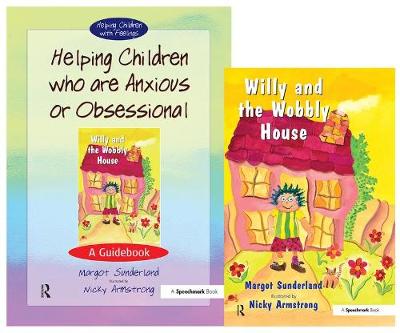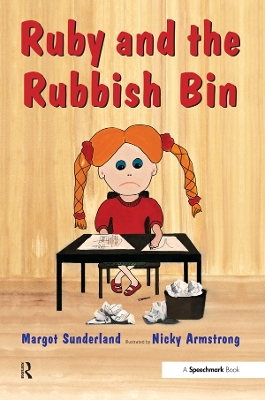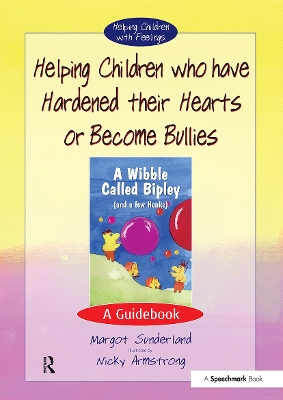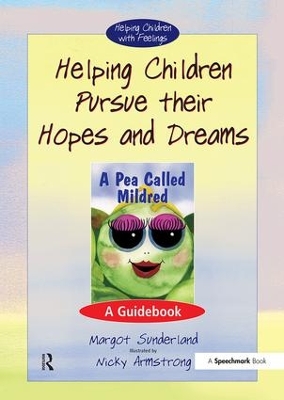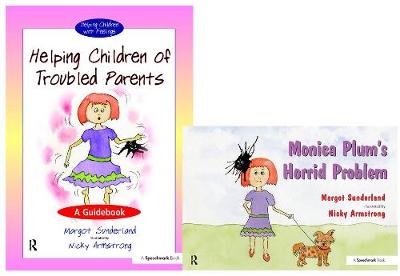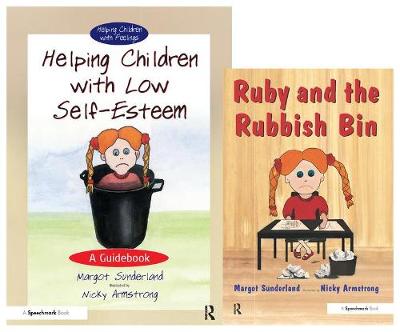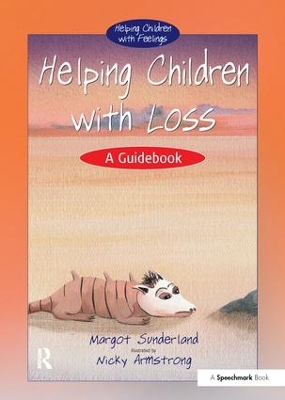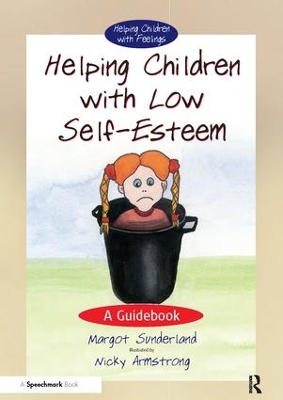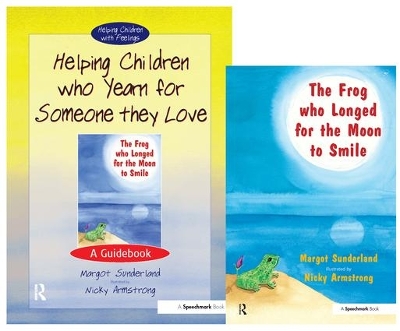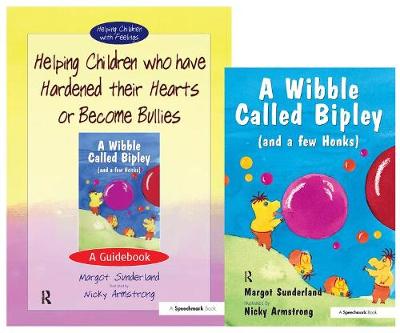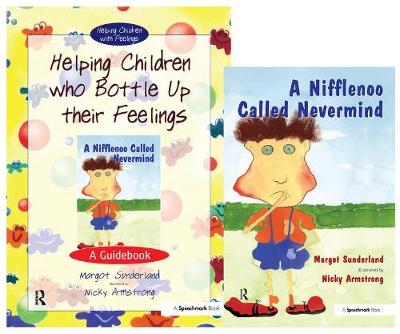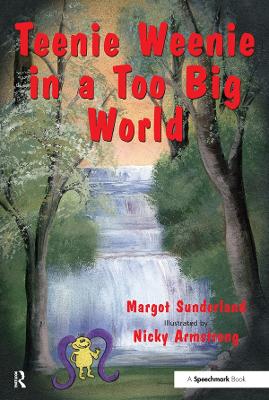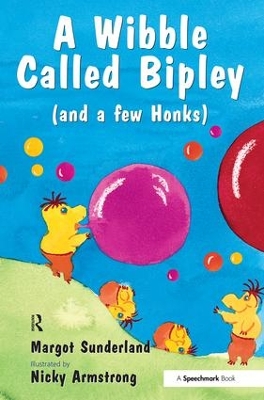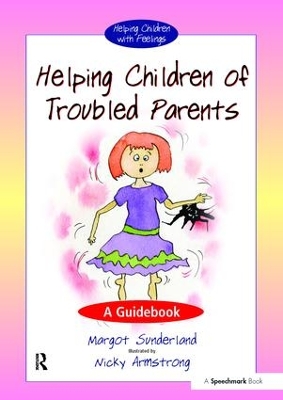Helping Children with Feelings
36 total works
Helping Children Who are Anxious or Obsessional & Willy and the Wobbly House
by Margot Sunderland
This practical guidebook, with a beautifully-illustrated storybook, enables teachers, parents and professionals to help children aged 4-12 connect with unresolved feelings affecting their behaviour.
This is a guidebook to help children who:
- are insecure or worry too much
- suffer from phobias or nightmares
- find it difficult to concentrate to let go and have fun
- have suffered a trauma
- are worryingly good or seem like little adults
- use order and routine as a way of coping with 'messy' feelings
- retreat into dullness as a way of managing their being in the world
- and develop obsessive-compulsive behaviour in order to ward off their too-powerful feelings".
Willy and the Wobbly House is a story for children who are anxious or obsessional. Willy is an anxious boy who experiences the world as a very unsafe, wobbly place where anything awful might happen at any time. Joe, the boy next door, is too ordered and tidy to be able to ever really enjoy life. Follow their adventures with the Puddle People who help them break out of their fixed patterns and find far richer ways of living in the world.
Ruby and the Rubbish Bin
by Margot Sunderland, Nicky Hancock, and Nicky Armstrong
Helping Children Who Have Hardened Their Hearts or Become Bullies
by Margot Sunderland and Nicky Hancock
This is a guidebook to help children who:
- bully or take revenge on others for the pain they have felt themselves
- have become very defensive because something too painful has happened to them
- have hardened their hearts because they have: been too hurt in love; met with too much harshness; witnessed parental violence; been repeatedly hit; been shamed or humiliated
- had too many experiences of not being responded to
- think they have lost their parent's love to someone else and have hardened their heart.
Helping Children Pursue Their Hopes and Dreams
by Margot Sunderland and Nicky Hancock
This is a guidebook to help children who:
- have been given too little encouragement to follow their hopes and dreams
- are too despondent or defeated to go after their hopes or their dreams
- are too busy surviving, so hopes and dreams are a luxury they cannot afford
- think that hopes and dreams are just for other people
- do not follow their dreams because they are too afraid of failing
- are following somebody else's star; and, only dream small dreams for themselves, from a fear of being big.
Helping Children of Troubled Parents & Monica Plum's Horrid Problem
by Margot Sunderland
This practical guidebook, with a beautifully-illustrated storybook, enables teachers, parents and professionals to help children aged 4-12 connect with unresolved feelings affecting their behaviour.
This is a guide book to help children who suffer the effects of:fFamily breakdown, separation and divorce, and witnessing parents fighting. It is suitable for Parents who suffer from depression or anxiety, mental or physical ill-health, alcohol or drug addiction.
Monica Plum's Horrid Problem is a story for children with troubled parents. Monica Plus has a horrid problem. It gets everywhere: into her school work, her dreams, her ability to make friends. People keep telling her to cheer up. She can't. She feels as if she is carrying around some very heavy luggage. Then one day, a helpful teacher sees how miserable Monica is, and tells her about the knights in the world, who are posing as people.
In a whispering wood, Monica finds some of these knights. They teach her how to make her problem far less horrid. In particular they show her how to cope when other people's problems weigh you down and make you feel miserable. Most importantly they show her how to do life well. Monica leaves whispering wood feeling empowered and ready to face what she could not face before.
Helping Children with Low Self-Esteem & Ruby and the Rubbish Bin
by Margot Sunderland
This practical guidebook, with a beautifully-illustrated storybook, enables teachers, parents and professionals to help children aged 4-12 connect with unresolved feelings affecting their behaviour.
Helping Children with Low Self-Esteem is a guidebook to help children who:
- don't like themselves or feel there is something fundamentally wrong with them
- have been deeply shamed
- have received too much criticism or haven't been encouraged enough
- let people treat them badly because they feel they don't deserve better
- do not accept praise or appreciation because they feel they don't deserve it
- feel defeated by life, fundamentally unimportant, unwanted or unlovable
- bully because they think they are worthless or think they are worthless because they are bullied
- and, feel they don't belong or do not seek friends because they think no-one would want to be their friend.
Ruby and the Rubbish Bin is a story for children with low self-esteem. Ruby hates herself so much that she often feels more like a piece of rubbish than a little girl. Sometimes Ruby feels so miserable that she wants to sleep and sleep and never wake up again. Then Ruby meets Dot and, over time, Dot helps Ruby to move from self-hate to self-respect. After a very important dream, and help from Dot, Ruby finds her voice and her anger, and stands up to the bullies. She makes new friends and knows what it's like to feel happy for the first time in her life.
This is a guidebook to help children who:
- are suffering from the pain of loss or separation from someone or something they love deeply
- have had a parent, relative or important friend leave or die
- are obsessed with their absent parent
- have lost someone they love, but have never really mourned
- are trying to manage all their painful feelings of loss by themselves
- feel that they have lost the love of someone they love deeply
- are suffering from separation anxiety
- and are adopted or fostered children who miss their birth parent terribly.
Helping children with loss using this engaging story and practical guidebook you can help children suffering from the pain of loss or separation. They may be: grieving for the death of a parent, relative or important friend; obsessed with an absent parent; struggling to mourn a loss; trying to manage all of their painful feelings by themselves; suffering from separation anxiety; and adopted or fostered children who miss their birth parent.
This is a guidebook to help children who:
- don't like themselves or feel there is something fundamentally wrong with them
- have been deeply shamed
- have received too much criticism or haven't been encouraged enough
- let people treat them badly because they feel they don't deserve better
- do not accept praise or appreciation because they feel they don't deserve it
- feel defeated by life, fundamentally unimportant, unwanted or unlovable
- bully because they think they are worthless or think they are worthless because they are bullied
- and feel they don't belong or do not seek friends because they think no-one would want to be their friend.
Helping Children Who Yearn for Someone They Love & The Frog Who Longed for the Moon to Smile
by Margot Sunderland and Nicky Hancock
This practical guidebook, with a beautifully-illustrated storybook, enables teachers, parents and professionals to help children aged 4-12 connect with unresolved feelings affecting their behaviour.
Helping Children who Yearn for Someone They Love is a guidebook to help children who:
- are missing someone too much or suffer from separation anxiety
- are obsessed with their absent parent
- yearn for a parent who: has died; seems unreachable, although is right there
- is loving one minute and indifferent, cold or abusive the next
They yearn because they have been taken into care, fostered or adopted.
The Frog who Longed for the Moon to Smile features a story for children who yearn for someone they love. Frog is very much in love with the moon because she once smiled at him. So now he spends all his time dreaming about her. He waits and waits for her to smile at him again. One day a wise and friendly crow helps frog to see how he is wasting his life away. All the time he has been facing the place of very little, he's had his back to the place of plenty.
Helping Children Who Have Hardened Their Hearts or Become Bullies & Wibble Called Bipley (and a Few Honks)
by Margot Sunderland and Nicky Hancock
This practical guidebook, with a beautifully-illustrated storybook, enables teachers, parents and professionals to help children aged 4-12 connect with unresolved feelings affecting their behaviour.
This is a guidebook to help children who
- bully or take revenge on others for the pain they have felt themselves
- have become very defensive because something too painful has happened to them
- have hardened their hearts because they have: been too hurt in love; met with too much harshness; witnessed parental violence; been repeatedly hit; been shamed or humiliated; or had too many experiences of not being responded to
- think they have lost their parent's love to someone else and have hardened their heart.
A Wibble Called Bipley features a story for children who have hardened their hearts or become bullies. Bipley is a warm cuddly creature, but someone has broken his heart. He feels so hurt that he decides it is just too painful to ever love again. When he meets some big tough Honks in the wood, they teach him how to harden his heart so that he doesn't have to feel hurt any more. Luckily Bipley meets some creatures that teach him how he can protect himself without hardening his heart.
Helping Children Who Bottle Up Their Feelings & A Nifflenoo Called Nevermind
by Margot Sunderland and Nicky Hancock
This practical guidebook, with a beautifully-illustrated storybook, enables teachers, parents and professionals to help children aged 4-12 connect with unresolved feelings affecting their behaviour.
This is a guidebook to help children who:
- are trying to manage their too painful feelings by themselves
- do not let themselves cry, protest or say that they are scared
- are living with too many unresolved painful emotions from the past
- have had disturbing, overwhelming or confusing experiences, which they have been unable to think through or feel through properly
- are full of unexpressed feelings because expressing them feels far too dangerous
- are full of unmourned grief.
A Nifflenoo Called Nevermind is a story for children who bottle up their feelings. Nevermind always carries on whatever happens! Each time something horrible happens to him he just tucks his feelings away and carries on with life. Find out what happens to Nevermind and how he begins to understand that his feelings do matter, how he learns to express them and stand up for himself.
A Wibble Called Bipley is story for children who have hardened their hearts or become bullies. Bipley is a warm cuddly creature, but someone has broken his heart. He feels so hurt that he decides it is just too painful to ever love again. When he meets some big tough Honks in the wood, they teach him how to harden his heart so that he doesn't have to feel hurt any more. Luckily Bipley meets some creatures who teach him how he can protect himself without hardening his heart.
This book is designed to enable practitioners to help children whose emotional wellbeing is being adversely affected by troubled parents. These are children who live with the burden of having to navigate their parent's troubled emotional states, often leaving them with a mass of painful feelings about a chaotic and disturbing world. They can feel alarmed by their parent rather than experiencing them as 'home', and a place of safety and solace.
The author explores the fact that when parents are preoccupied with their own troubles, they are often unable to effectively address their child's core relational needs, e.g. soothing, validating, attunement, co-adventure, interactive play. As a result, children are left self-helping, which all too often means drugs, drink, self-harm, depression, anxiety, eating disorders or problems with anger in the teenage years.
This guidebook offers readers a wealth of vital theory and effective interventions for working with these children and, specifically, the key feelings such children need help with. Particular focus is given to the effects on children of: family breakdown, separation and divorce, witnessing parents fighting, and parents who suffer from depression or anxiety, mental or physical ill-health, alcohol or drug addiction. Readers will learn:
- the complexity of children's feelings about their troubled parents
- how to enable children to address their unspoken hurt, fear, grief, rage, and resentment about their troubled parent in order to move forward in their lives
- how to empower children to find their voice when they have been left in the role of impotent bystander
- effective parent-child intervention when parental troubles are adversely affecting the child
- and how to help a parent and child 'find' each other again.

